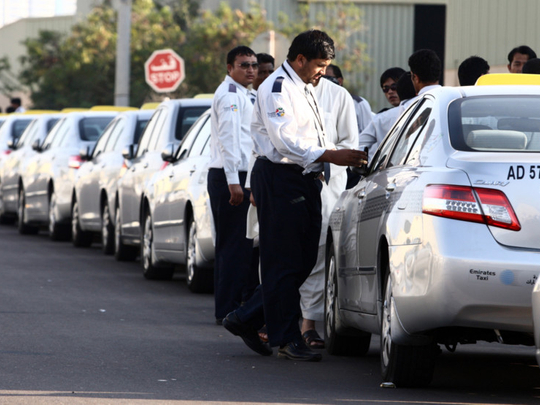
Abu Dhabi: Abu Dhabi’s taxi regulator may soon force drivers to take up to four days off each month, following recent complaints about lack of rest days and other working conditions.
Many drivers themselves prefer not to take the four days of leave they are entitled to as it can place them on a lower commission structure, Mohammad Al Qamzi, director-general at the Centre for Regulation of Transport by Hire Cars (TransAD), told Gulf News.
“Because drivers want to make a certain amount of money each month, many end up not taking leave. What they must understand is that they can simply work harder on other days, such as during the peak hours when demand is high but roads are crowded, so that taking leave does not eat into their commission,” Al Qamzi said.
He was speaking to Gulf News following reported protests by drivers recently. There are currently 7,645 public taxis operated by seven taxi franchisees. The recent protests at three franchisee companies were not prolonged, Al Qamzi said.
One of the main complaints was a perceived lack of leave. In addition to the lowered commission that supposedly acts as a disincentive against taking leave, Al Qamzi said drivers also do not like being assigned different vehicles when they get back to work.
“Many drivers need to turn in their cars on their days off, and they don’t like getting a new car. These are, however, simple reasons that should not dissuade drivers from taking leave and then later complaining about it. So we might mandate that drivers take at least two of their four entitled leave days each month,” he said.
One taxi driver told Gulf News that his company used to deduct Dh25 for every day he didn’t go to work.
“Since the protest, the company has agreed to no deductions for the first two days off each month, and we were happy at the consideration,” he said.
Gulf News learnt that drivers also demanded higher commissions during the protests, but taxi franchisees were not willing to comply. At present, every driver gets a basic salary of Dh800, along with health insurance and free accommodation.
“On average, drivers earn Dh12,000 of revenue each month, except during the Ramadan slowdown. Despite the varying commission structures set by each franchisee, a driver then gets to take home about Dh4,000 to Dh5,000 on average,” Al Qamzi explained.
Asked about money deducted for vehicle maintenance in case of accidents, Al Qamzi said this was only done if the driver was at fault.
“Much of the repair cost is covered by vehicle insurance. Drivers do need to pay more than 50 per cent, and we don’t want to change this as the money involved forces drivers to be more careful on the roads,” he said.
Another taxi driver said the recent protests had been unwarranted as working conditions were not that bad. “Yes, we do not get air tickets and often have to work long hours during summer in order to meet target. But who doesn’t? At the end of the day, such protests only erode the company’s goodwill towards us. So, many of us chose not to participate,” he said.
Al Qamzi, in turn, urged drivers to forward their concerns to the TransAD’s driver care centre, which currently receives about 150 grievances a month.
“This provides a legitimate channel for resolving issues instead of sporadic protests that can disrupt workflow and morale,” he added.








